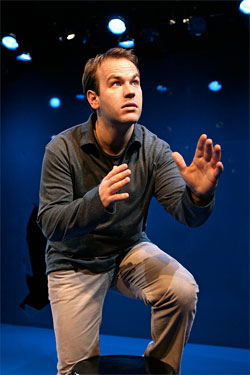
This coming Sunday will mark the 198th and final time Mike Birbiglia will perform his one-man show Sleepwalk With Me at the Bleecker Street Theatre. In the 90-minute monologue, with only a stool and a beat-up copy of the insomniac’s reference The Promise of Sleep as props, Birbiglia expertly alternates between stand-up comic and earnest confessor. He tosses off one-liners (“I don’t have a weight problem, but I am the kind of guy who could really put the brakes on an orgy”) and mimes the absurd antics of his disturbed sleep (e.g. the Olympics of DustBuster-ing), but also details his medical traumas, failed relationships, family dysfunction, and professional humiliations. Birgbiglia spoke with Vulture about the challenges of the show.
This show is pretty personal. We’re guessing you must have had to put some distance between yourself and the events to be able to do it.
Yeah. There are times when I forget that this has happened to me. There are times when I’ll go, “Oh Jesus. That’s me? That guy is fucked up. That guy’s got issues.” I feel a bit removed from it, in a sense.
How do you deal with fatigue with the material? The material is largely you. Don’t you run the risk of getting tired of yourself?
That’s right. Fortunately, I was tired of myself before the process began. Sometimes I’ll say to my producer before I walk onstage at the beginning of the show, “I’ll see you in a couple hours. I’ve got to go talk about myself onstage for an hour and a half.” There’s something very unhealthy about it. I’m aware of that. But when all is said and done, it’s just an acting exercise.
How much of Sleepwalk is improvised?
The first seven minutes of the show is where I usually kind of feel out the crowd and go off-book sometimes. Other than that, the script stays almost identical every night. Many people who see it think the show is improvised. We’ve had people who’ve come two or three times, and in some cases, four times, and I’ve actually asked them, “Are you getting anything from this? Is this enjoyable at all?”
How do you keep it fresh for them and for yourself?
Depending on what’s going on in my life, different themes get accentuated. Let’s say, for example, on one day I’ll speak, I’ll catch up with my mom before the show. There’s a thread about my mom that goes through the show and that day’s show will be more about her. In the show I talk about how I had a testoscopy, and in February [I had] another one. It was really painful. Those audiences really felt the specifics of the testoscopy that week.
So it’s scripted line by line, but you vary in how you deliver it?
Exactly. For example, I have a line in the show that I only say once, in any of nine or ten different places, depending on where I sense the greatest gasp from the audience. The line is “I know, I’m in the future also.” For example, I might use it with the story where I cheat on my ex-girlfriend, or my girlfriend at the time. That’s a tough one to tell in comedy clubs. In theatre, there’s the conceit of, you know, this person onstage is a character. He can have flaws. In stand-up, it’s like, “This guy’s a dick.” It almost pushes you into a different genre of comedian, into an Andrew Dice Clay area, where it’s like, this guy is bragging on cheating on his girlfriend. And you’re like, “No. I’m in on it. I know I was wrong. I’m aware. I’m in the future also.”
Do audience responses vary much?
Yeah. On occasion people have fallen asleep or someone will not be able to hear as well as someone else and they’ll just go, “Talk louder.” So I’ll walk over and talk to them about what they can hear and what they can’t hear. One night there was a guy in the front row text messaging during my final speech. And there really is no comedy in the final speech; it’s this personal moment between me and my dad. And here’s a guy in the front row text messaging. I’m not going to stop the flow of the show. That’s a really delicate thing to deal with. So I directed my body toward him and basically did the whole speech to him. He was my dad. He was text messaging while I was talking, and it actually made it pretty good. My stage manager came back and said there was a real fire to that last speech. I said, “Yeah, the guy in the front row was text messaging, so I gave him some fire.”




